Israel-Hamas War: What happened on day 124?
Israeli PM: Victory in Gaza within striking distance, IDF will operate in Rafah • IDF to increase mandatory service, reserve duty amid war in Gaza
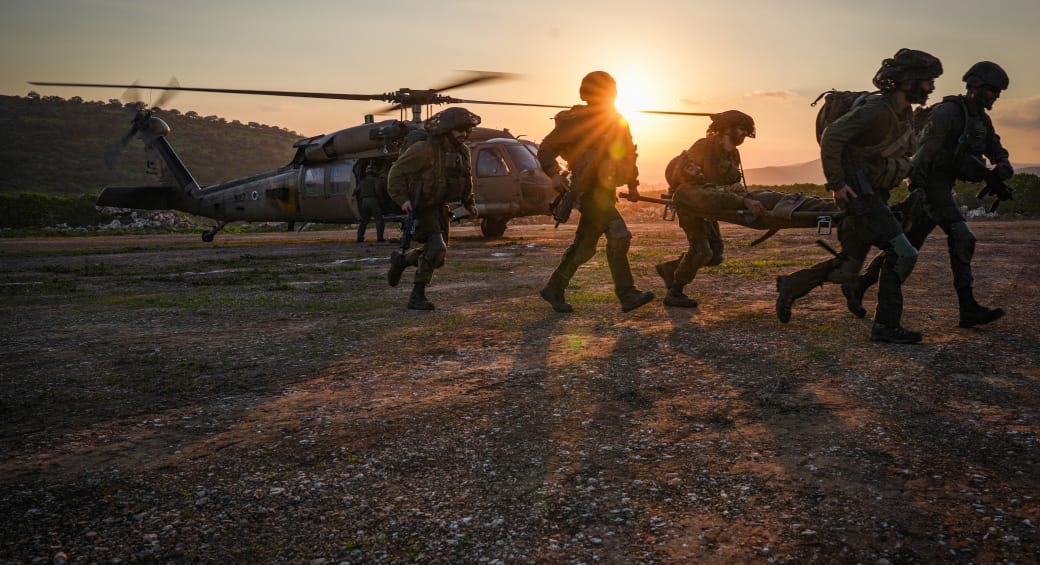
Israel strike targets Syrian army outposts in Homs province - Syrian state media
Syrian air defenses shot down a number of missiles, state media said, without giving details on the targets hit.
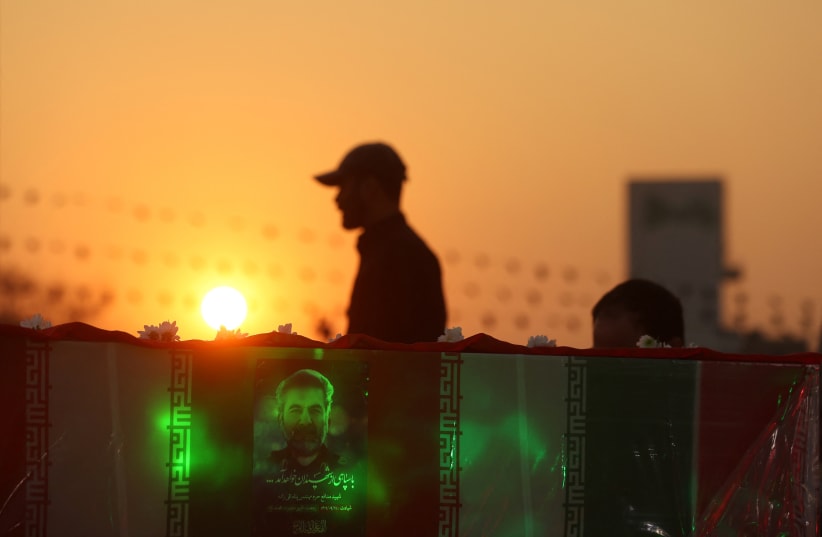
Israeli missiles struck Syria's Homs, Syrian state media reported on Wednesday, with local sources saying the attacks targeted several Syrian army outposts and an airbase in the area.
Syrian air defenses shot down a number of missiles, state media said, without giving details on the targets hit.
Since the Oct. 7 attack by Hamas on Israeli civilians and soldiers, Israel has escalated its strikes on Iranian-backed militia targets in Syria and also struck Syrian army air defenses and some Syrian forces.
The attacks targeted the Shuyrat airbase and the several locations on outskirts of Homs, according to a Syrian military intelligence source familiar with the matter.

A military source later told state media that there were several casualties and people injured as well as damage to property.
State television showed ambulances rushing to the scene of a strike, where wreckage and debris lay from a building that was hit. Reuters could not verify the location of the site.
Iran's growing influence
Israel has for years carried out attacks on what it has described as Iran-linked targets in Syria, where Tehran's influence has grown since it began supporting President Bashar al-Assad in a civil war that started in 2011.
Fighters allied with Iran, including Hezbollah, now hold sway in vast areas in eastern, southern and northwestern Syria and in several suburbs around the capital.
Go to the full article >>Thomas Hand still fighting for hostage deal after his daughter's release
Thomas Hand joined the delegation of Knesset members and other hostage family members to meet with lawmakers in Washington, DC to advocate for a hostage deal.

Thomas Hand's nine-year-old daughter Emily was kidnapped on Oct. 7, and was returned in the first hostage deal after more than 50 days in captivity.
Though Emily is now home, Thomas joined the delegation of Knesset members and other hostage family members to meet with lawmakers in Washington, DC to advocate for a hostage deal.
"What can I do? I got my loved one back," Thomas said to The Post. "Every parent, brother, and sister needs to get their loved one back."
"I can only help just by being here, because of what's happened to me and my family somehow gives support to them, gives them hope that it's possible that it can happen," Thomas said.
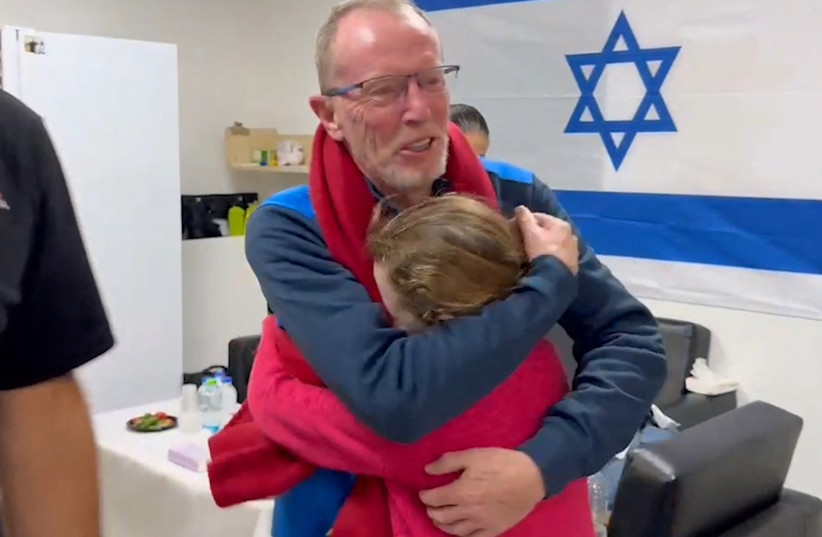
Holding out hope in the face of war
After four months, Thomas said it's hard to keep up hope.
"It just fades and fades and fades," Thomas said. "I hope I lift their spirits."
Thomas said every person on Capitol Hill the delegation spoke to on Tuesday was very positive.
"They're going to support us until the very end," Thomas said. "No matter what."
Two months after her release, Thomas said Emily is doing fantastic.
"You would not believe she spent two months in Gaza," Thomas said. "She's incredibly strong."
Go to the full article >>Majority of Israelis prioritize hostage release over toppling Hamas - poll
Israelis who prioritize the rescue of hostages have clashed with Israelis who believe that the IDF completely removing Hamas from power should be the priority.
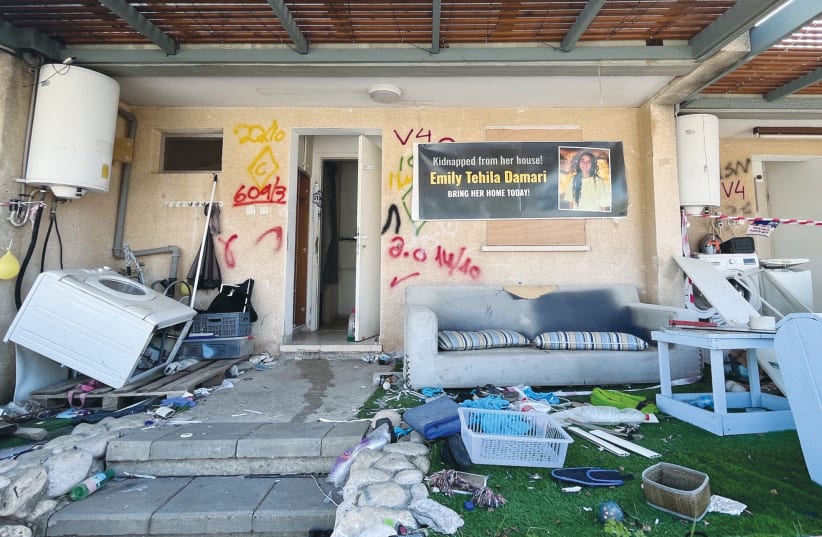
Nearly half (47%) of Israeli residents believe returning the hostages taken by Hamas on October 7th is the highest priority of Israel’s war against Hamas – whereas 42% of Israelis said that toppling Hamas’ grip over the Gaza Strip should be Israel’s main priority, a poll published Tuesday by the Israeli Democracy Institute (IDI) discovered.
The 47% to 42% split is divided further based on demographics, with 53% of female respondents saying that releasing hostages is the most important factor in the war compared to 40% of male respondents. 69% of Arab-Israelis said bringing the hostages home should be the main goal, versus a tiny minority (8%) who prioritize toppling Hamas. A sizeable 23% of Arab Israelis say they don't know.
Responses to the question of what Israel’s main goal of the war should be were further divided on political lines. For example, 71% of respondents who identify with Israel’s Labor party said the primary goal should be retrieving hostages, while 20% of Labor party supporters said the primary factor of the war should be to defeat Hamas militarily. Conversely, 77% of Religious Zionism supporters said defeating Hamas should be Israel’s primary goal, compared to 19% who said saving Israeli hostages superseded the need to defeat Hamas.
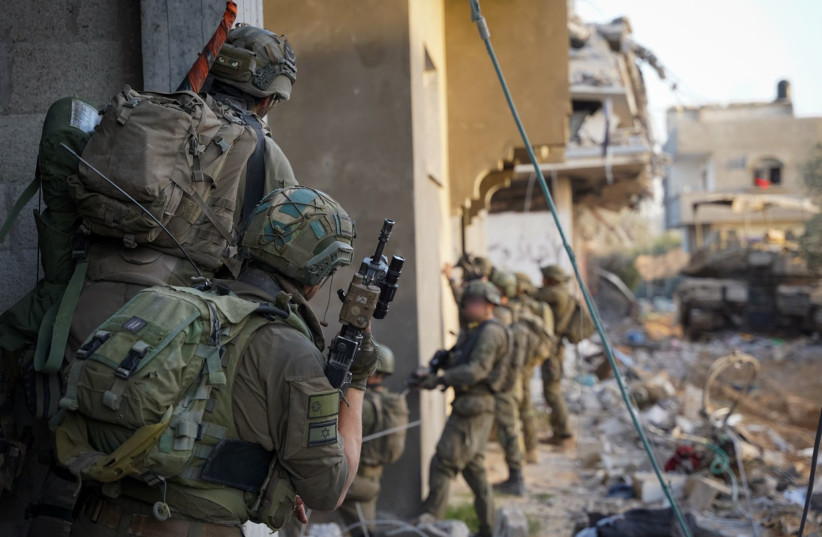
Hostages and Hamas polarize Israelis
While Israelis have multiple considerations when it comes to the Israel-Hamas War and the future of the Israeli-Palestinian conflict, Israelis who prioritize the rescue of hostages have clashed with Israelis who believe that the IDF completely removing Hamas from power should be the priority.
Demonstrators protested in front of President Isaac Herzog’s Residence in Jerusalem on Saturday night, calling for more action to be taken to release the hostages and demanding the immediate announcement of elections.
Prime Minister Benjamin Netanyahu said in the Likud faction meeting that defeating Hamas "will take time, months, not years," Israeli media reported on Monday. Furthermore, he stated, "Our goal is complete victory on Hamas. We will kill the leadership of Hamas. That's why we need to continue to operate in all areas of the Gaza Strip. We must not end the war before then."
While the question of prioritizing hostages compared to military goals is the biggest question in Israeli public discourse, there are several pertinent topics the IDI poll covered.
When it comes to Israeli elections, which are currently scheduled for November 2026, 71% of respondents said that the elections should be called sooner: 38% of respondents think elections should be held when the war ends, while 33% think elections should be announced now and then held in around three months. Although 38% of Jewish Israelis in the political right wing said elections should be held at the previously scheduled time, only 6% of left-wing Israelis agreed.
Regarding a now-suspended inquiry into the Israeli government’s internal failures on October 7th, 43% of Israeli respondents said the suspension was the right move, compared to 42% who said the inquiry should proceed.
Pollsters also asked how Israelis feel about the International Court of Justice case brought against Israel by South Africa, which purported that Israel is committing genocide against Palestinians. 50% of Jewish Israelis said the ICJ ruling was too harsh against Israel, though 39% of Jewish Israeli respondents said they felt the ruling was lenient. Only 19% of Arab Israelis said the ICJ ruling against Israel was harsh, compared to 46% who called it lenient and 35% who said they did not know.
Furthermore, only 39% of Israelis think the State of Israel is successfully ensuring the security of its citizens – this is similar to the rate in 2022 but represents a sharp decline from 76% in 2020 and 56% in 2021.
Go to the full article >>Hamas's response to Gaza hostage deal 'a little over the top' - Joe Biden
Blinken said in Qatar that he would discuss Hamas's response with Israeli officials when he visits the country on Wednesday.
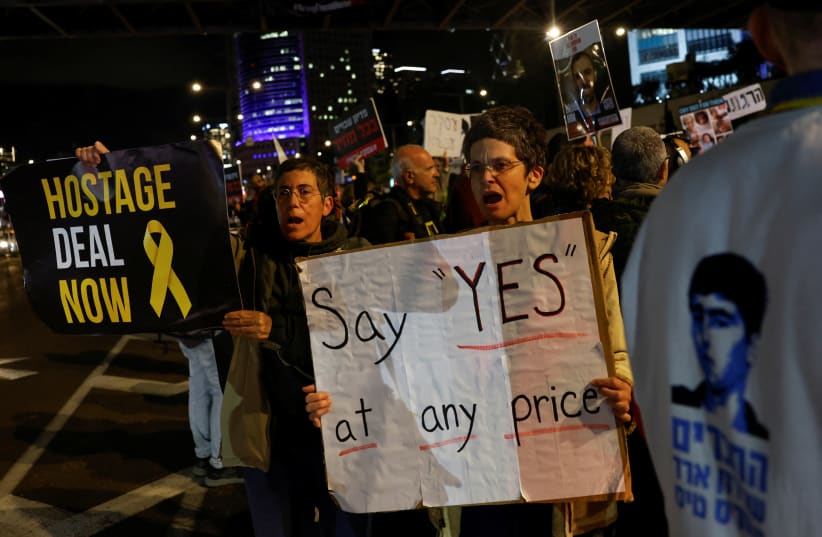
Hamas’ counter-proposal for the release of 132 hostages held in Gaza is “a little over the top,” US President Joe Biden said Tuesday night, as Israel braced for the four-month anniversary of the October 7 attack in which the captives were seized.
Biden attempted to put a positive spin on possibly a deal even though Hamas and Israel have been at loggerheads on the question of whether the agreement would include a permanent ceasefire or a pause to the Gaza war.
There “is some movement,” Biden told reporters at The White House, adding that “they’re continuing negotiations right now.”
Blinken is due to arrive in Israel after visiting Saudi Arabia, Egypt, and Qatar, as part of his effort to help the parties finalize a deal. The latter two countries are mediating the agreement.
The Prime Minister’s Office immediately stated that “Hamas' answer was forwarded by the Qatari mediator to the Mossad. Its details will be studied in depth by all the parties involved in the negotiations,” it said.
In its statement, Hamas said it had “dealt with the proposal in a positive spirit, ensuring a comprehensive and complete ceasefire, ending the aggression against our people, ensuring relief, shelter, and reconstruction, lifting the siege on the Gaza Strip, and achieving a prisoner swap.”
A Hamas official who asked not to be identified reiterated to Reuters earlier on Tuesday that the movement would not allow any hostage releases without guarantees that the war would end and Israeli forces would leave Gaza.
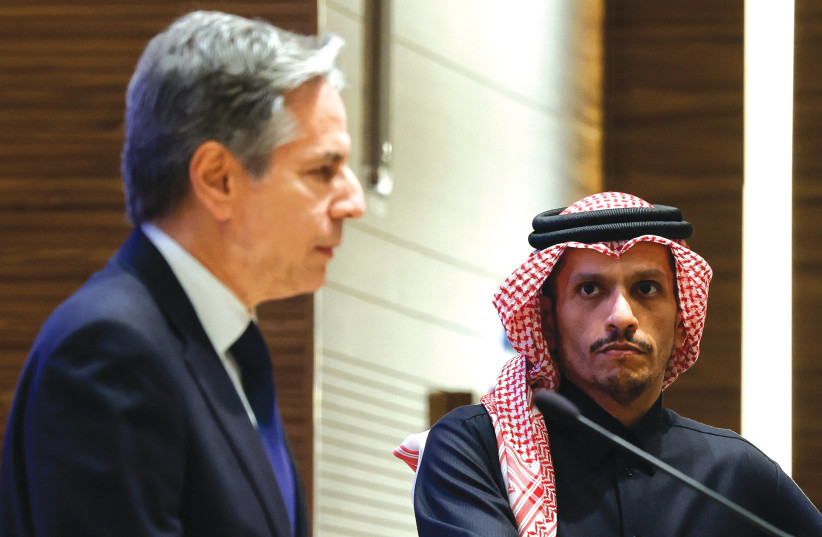
Netanyahu has been under domestic pressure from relatives of the hostages to make a deal, while coalition parties have warned that they will quit the government if he does so at any price.
In a statement that underscored the price of protracted negotiations, IDF chief military spokesperson Rear Admiral Daniel Hagari said Tuesday that 31 of the remaining hostages held in Gaza were pronounced dead.
"We have informed 31 families that their captured loved ones are no longer among the living and that we have pronounced them dead," he told a regular media briefing.
Four months after the traumatic Hamas-led October 7 attack, in which 1,200 people were killed and 253 captives seized, Netanyahu has insisted that victory is an existential necessity and that victory is within the IDF’s grasp but has given no timeline for the end of the war, except to state that it could last months and not years.
The international community has called for Israel to halt the war or at the very least pause it, in light of Hamas’ assertion that over 27,000 Palestinians have been killed. Israel has said that at least 9,000 of those are combatants.
In Doha, Qatari Prime Minister Mohammed Al-Thani held a joint press conference with Blinken in which they put a positive spin on the possibility of a hostage deal.
“The reply includes some comments, but in general, it is positive. However, given the sensitivity of the circumstances, we will not tackle details,” Thani said.
“We are optimistic and we have delivered the response to the Israeli party,” he said, adding that there were “more prospects for a better result.”
“There will be further negotiations and discussions of the details,” Thani said. “
His words came after a tense week in which Israel has waited for the response, with the absence of public details sparking intense debates about what possible price Hamas would demand for the deal, which is being mediated by Qatar and Egypt.
Blinken said the US has worked intensely to free the 132 hostages held by Hamas in Gaza.
The first hostage deal was executed at the end of November, in which 105 of the captives were released. Another five were freed separately and the bodies of 11 of the captives were returned to Israel. Israel also counts two IDF soldiers killed during the 2014 war and another two Israelis held captive before October 7, bringing the number of hostages to 136.
Blinken said, “We will continue to use every tool available to us to reach an extended pause that gets hostages out, brings more [humanitarian] assistance in, that brings calm to Gaza's civilians and that keeps diplomacy moving forward to a more integrated region."
“Now that we have the response from Hamas, we are going to be very intensely focused on that. But there is a lot of work to be done to achieve it, we are very focused on doing that work,” he said.
Blinken noted that Hamas created this situation with its October 7th attack and its refusal since then to free the hostages and put down its arms.
Still, he said, when in Israel, he plans to insist that the government must produce results, not just announce an “intention to act” when it comes to some of the demands the US has made concerning the Gaza war.
Thani called for the international community to insist on a ceasefire in Gaza and warned that defunding the United Nations Relief and Works Agency, which services Palestinian refugees, would have “catastrophic repercussions.”
“We fear complete defunding,” Thani said. He added that Qatar had sent two thousand tons of humanitarian assistance and two field hospitals to Gaza, Thani explained.
Blinken said that his trip was not just focused on the deal but also on larger regional agreements.
On the agenda for his trip has been the revival of a Riyadh-Washington security pact that would include a normalization deal between Israel and Saudi Arabia.
Blinken spoke about the importance of integrating Israel into the region through the creation of a two-state resolution to the conflict.
In order to do that, he said, “two things are required; an end to the conflict in Gaza and a clear and credible time-bound path to the establishment of a Palestinian state.”
Such a move, Blinken said, would provide “immense benefits” because it would provide Israel with “further integration into the region.
But the focus, for Israel, has been the hostages and the war.
To underscore the importance of making a deal quickly, Knesset Speaker Amir Ohana led a delegation of hostage relatives to Capitol Hill to speak with select members of Congress.
Another delegation is in Paris, where the French government is scheduled to hold a special ceremony to mark the months since the Hamas-led October 7 attack, in which 1,200 people were killed in Southern Israel and another 253 seized. A November deal that paused the war for a week saw the release of 105 hostages. Another five were freed separately, and the bodies of 11 of the captives have been returned to Israel.
Some 42 French citizens were among those killed, and some of its citizens were among the captives.
French President Emmanuel Macron plans to issue a special statement at the event. In Israel, relatives of those killed at the Nova Music Festive that October day plan a Jerusalem march near the Knesset. On Tuesday night, Prime Minister Benjamin Netanyahu met with relatives of the victims of the massacre, telling them that he “embraced them” and underscoring the impotence of total victory over Hamas.
Reuters contributed to this report.
Go to the full article >>Nearly quarter of all hostages held by Hamas in Gaza dead, IDF believes - report
The families of the 32 deceased individuals whose deaths have been confirmed have been informed.
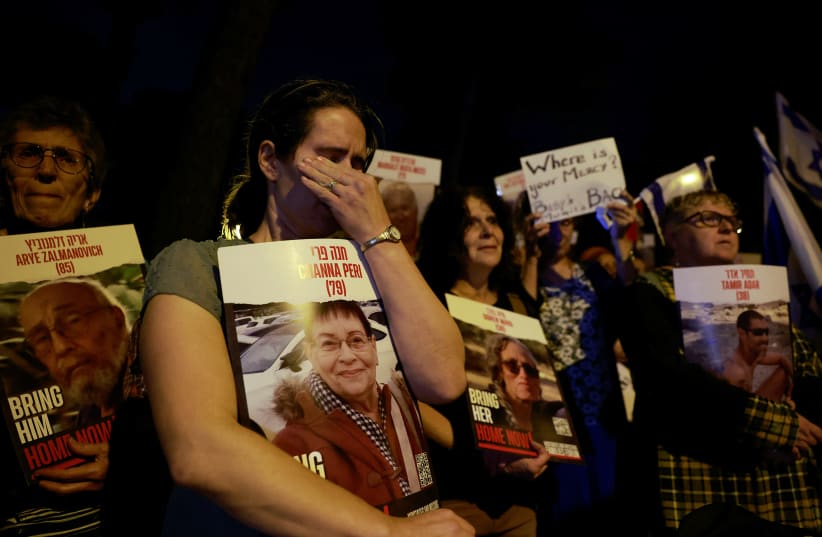
At least 32 hostages held in Gaza, nearly a quarter of the estimated 136 hostages held captive in the Hamas-run enclave, are dead, the New York Times reported on Tuesday, citing the IDF.
The families of the 32 deceased individuals whose deaths have been confirmed have been informed.
Hamas has yet to confirm or reject the IDF report. Further, the Islamist terror organization has a history of reporting hostages killed in captivity as having been hit by Israeli airstrikes.
Also, in announcing the deaths of hostages in its captivity, Hamas has previously released teaser videos prior to such announcements.
The NYT noted that while Israel strives to place mounting pressure on Hamas to release hostages through its military campaign in the Strip, the families of many of the hostages still in Gaza have said the IDF’s operations have placed the hostages at further risk.

Most hostages returned in swaps with Hamas
The vast majority of the hostages returned from captivity were released during December’s pause in the fighting when Israel swapped Palestinian security prisoners for hostages.
Ori Megidish was rescued by IDF troops in October of last year, but no other hostages have since been rescued in this manner thus far.
An additional three hostages, Yotam Haim, Samer Talalka, and Alon Shamriz, were mistakenly killed by IDF fire in December.
Speaking to the NYT, the IDF stated that it was “deploying all available resources to locate and retrieve as much information as possible regarding the hostages currently held by Hamas.”
Later, the Hostages and Missing Families Forum released a statement slightly disputing the figure of 32 dead hostages.
"According to the official data we have, there are 31 [dead hostages]," the forum stated. "Before the publication of the article, a coordinated message was delivered to all the families of the captives by liaison officers stating that there is no change in the estimates of the situation."
Go to the full article >>Ceasefire between Israel and Hezbollah 'within weeks,' US hopes
The Biden administration plans on bringing an end to the conflict in Israel’s north.
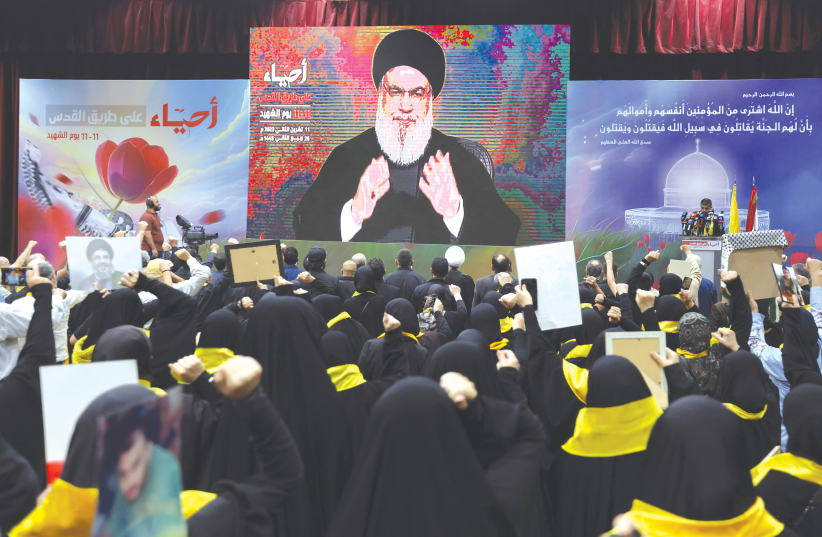
The Biden administration, along with its NATO allies - France, Britain, Germany, and Italy, hopes to announce within a few weeks the new understandings that will put an end to the fighting between Israel and Hezbollah and restore calm to the northern border. Senior Israeli officials and a knowledgeable source close to this issue revealed this.
The main objective of the Biden administration since October 7 has been to prevent a full-scale war between Israel and Hezbollah and to prevent the Gaza crisis from spreading to other countries in the Middle East. Biden entrusted the Israeli-Lebanese portfolio to his close advisor, Amos Hochstein, who conducted negotiations between Israel and Lebanon for the maritime border agreement signed in October 2022.
Sources familiar with the matter said that the United States hopes that the prisoner exchange agreement between Israel and Hamas will lead to a decrease in the fighting in Gaza and contribute to achieving calm on the northern border. However, the US is prepared to announce the new understanding between Israel and Lebanon even if that does not happen.
The clashes along the northern border between Israel and Hezbollah have been escalating for the past four months. Israel has evacuated tens of thousands of residents from settlements near the border due to fears of a raid by Hezbollah's Radwan forces. These residents are currently unable to return to their homes.
Israel has repeatedly stated that the situation along the border must change, either through diplomatic or military means, to allow the residents to return safely. One of Israel's conditions is for Hezbollah's Radwan forces to be pushed about 10 kilometers away from the border with Israel, beyond the range where anti-tank missiles can reach Israeli communities.
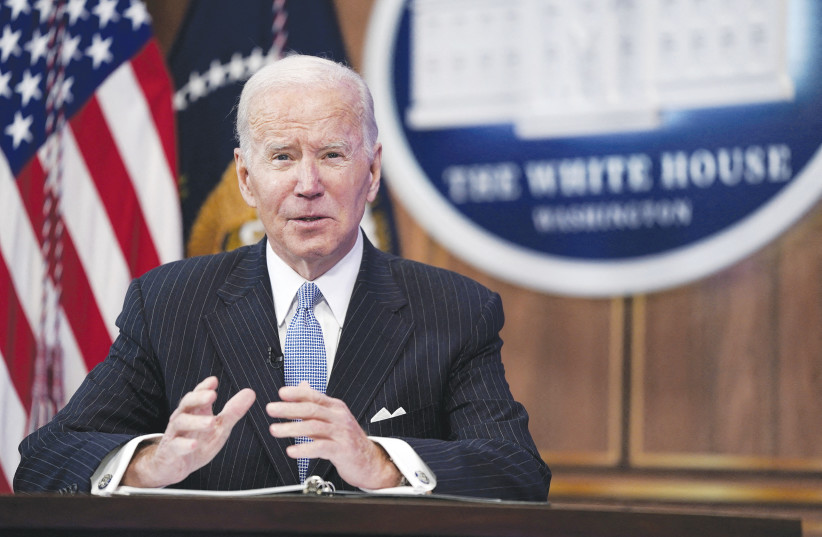
During his visit to Israel on Sunday, former German Minister Heiko Maas discussed his proposal for new arrangements along the border with Prime Minister Benjamin Netanyahu, Defense Minister Yoav Galant, and Minister Benny Gantz.
The plan is based on an old proposal used by the US in the past
The US plan is based on the model of "Operation Grapes of Wrath" that the United States and several Western countries declared to end an Israeli operation in Lebanon in 1996. The parties will not formally sign the new arrangements, but rather, the United States and four European countries will issue a statement specifying the commitments made by each side. Additionally, the United States, France, Britain, Germany, and Italy will announce an economic assistance package to Lebanon to incentivize Hezbollah to agree to the arrangements and present it as an achievement to the Lebanese public.
The new arrangements will focus on partially implementing UN Security Council Resolution 1701, which ended the Second Lebanon War. It is important to note that both sides will only be required to comply with some provisions of Resolution 1701 fully. Thus, the new arrangements can be implemented even without a complete ceasefire in Gaza, as demanded by Hezbollah.
Under the new arrangements, both sides will commit to ceasing the exchange of fire occurring in the border area starting October 7. Hezbollah will not be required to withdraw its forces from north of the Litani River, as demanded by Resolution 1701, but only to a distance of 8-10 kilometers from the border with Israel. It is worth mentioning that the exchanges of fire between the sides since October 7 have already led Hezbollah to withdraw its Radwan forces to a distance of 7-10 kilometers along almost the entire length of the border with Israel.
The new arrangements will be based on the principle of "freezing the situation," where Hezbollah will not be required to withdraw its forces from their current positions but rather return them to the positions they held near the border before October 7. As part of the arrangements, the Lebanese Army will deploy 10-12 thousand soldiers along the border with Israel.
Israel must also take specific steps as part of the arrangements. The United States has requested Israel to cease fighter jet flights in Lebanese airspace, a request which Israel has not rejected. Israel will also commit to withdrawing some of its forces that have been concentrated at the border over the past four months, mainly reservists.
In January, the Biden administration was deeply concerned about the potential escalation to a full-scale war between Israel and Hezbollah. Biden discussed the issue with Netanyahu, and Defense Secretary Lloyd Austin and Secretary of State Antony Blinken also talked with their Israeli counterparts. An informed source indicated that the American message to Israel was that any Israeli military action would be met with an all-out war by Hezbollah, with the organization mobilizing all its pro-Iranian militias in Iraq and Syria to support Hezbollah in its fight against Israel.
The Americans made it clear to Israel that they did not underestimate the capabilities of the IDF to inflict severe damage on Lebanon but believed that engaging in such a campaign would be a strategic mistake. Two senior Israeli officials stated that Israel did not
Go to the full article >>
IDF chief: No stone will be left unturned in October 7 investigation
Netanyahu has opposed any broad probes about October 7 and has opposed anyone trying to label him as having part of or significant responsibility for the failure.
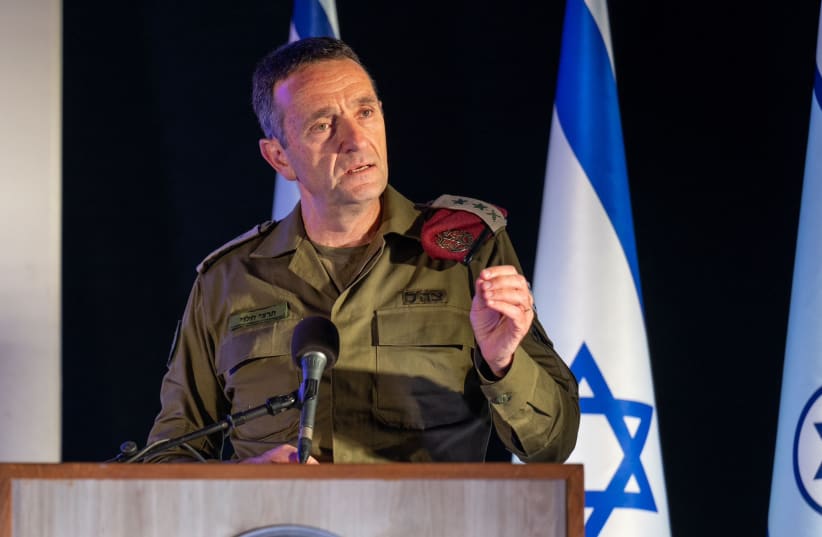
IDF Chief of Staff Herzi Halevi implied on Tuesday that he will open an internal IDF review of the failure to stop Hamas’s October 7 invasion of southern Israel in the coming weeks.
While part of Halevi’s speech at a conference held by the Air Force emphasized the idea of moving forward with the internal probe, the IDF chief said nothing about the external probe that he had originally tried to kick-start on January 4 and that was to be led by former IDF chief Shaul Mofaz.
Following withering criticism from Prime Minister Benjamin Netanyahu and without support from Defense Minister Yoav Gallant, Halevi seems to have dropped this probe or delayed it indefinitely until after the internal investigation.
Netanyahu opposes having any significant responsibility for October 7
Netanyahu has opposed any broad probes about October 7 and has challenged anyone trying to label him as bearing partial or significant responsibility for the failure.
In political and security terms, this means that the IDF, rather than former defense officials who were not involved, will be judging its own errors and that no broader strategic issues will be raised.
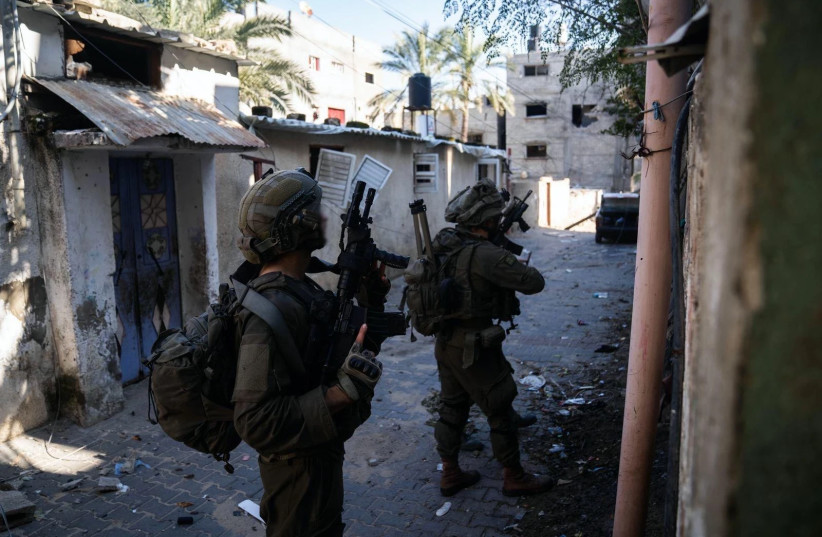
Halevi defended the delay in the internal probe until now, saying that the IDF had to focus on defeating Hamas as well as managing the conflict with Hezbollah.
Also, the IDF released the name of Maj. David Shakuri on Tuesday evening as the latest Israeli soldier to have fallen in combat in Gaza. Shakuri, 30, from Rehovot, was a deputy commander of the 601st Battalion of the 401st Brigade. He was killed in combat in northern Gaza.
IDF fighter jet demolishes Hezbollah observation post in southern Lebanon
The IDF continued mopping up operations throughout northern, central, and southern Gaza on Tuesday but has largely achieved operational control except in Deir al-Balah and Rafah, where most of the 2.3 million Palestinian civilians are and where Hamas’s leadership and the Israeli hostages may be.
In the North, Israeli Air Force jets targeted a military building used by Hezbollah in the region of Marwahin in southern Lebanon, the IDF Spokesperson’s Unit reported on Tuesday.
In addition, on Monday night, jets attacked Hezbollah’s operational infrastructure in the Meiss Ej Jabal area in southern Lebanon.
IDF artillery also fired toward areas in southern Lebanon to remove various threats.
The military further noted that artillery forces also fired at the sources of rocket fire into Israeli territory on Tuesday. As a result of these rockets, two IDF soldiers were lightly wounded and evacuated for medical care.
Earlier on Tuesday, an IDF unmanned aerial vehicle (UAV) attacked a target in the village of Marwahin, N12 reported, citing Lebanese sources.
On Tuesday night, the IDF produced new documents that it obtained from tunnel areas in Khan Yunis, purporting to show the transfer of $154 million in funds from Iran to Hamas. It showed envelopes of funds provided to Hamas Gaza Chief Yahya Sinwar and the seizing of large volumes of Hamas funds that were left behind.
Go to the full article >>Saudi Arabia says there will be no diplomatic relations with Israel without Palestinian state
The kingdom stated to affirm its steadfast position to Washington on the Palestinian issue in the light of the comments attributed to Kirby.

Saudi Arabia has told the US its position stands that there will be no diplomatic relations with Israel unless an independent Palestinian state is recognized on the 1967 borders with east Jerusalem, and Israeli "aggression" on the Gaza Strip stops, the Saudi foreign ministry said in a statement on Wednesday.
On Tuesday, White House National Security spokesperson John Kirby said that the Biden administration has received positive feedback that Saudi Arabia and Israel are willing to continue to have normalization discussions.
The kingdom stated to affirm its steadfast position to Washington on the Palestinian issue in the light of the comments attributed to Kirby, the ministry said.
Attempts to normalize ties
The idea of Israel and Saudi Arabia formally cementing ties has been under discussion since the Saudis gave their quiet assent to Gulf neighbors United Arab Emirates and Bahrain establishing ties with Israel in 2020.
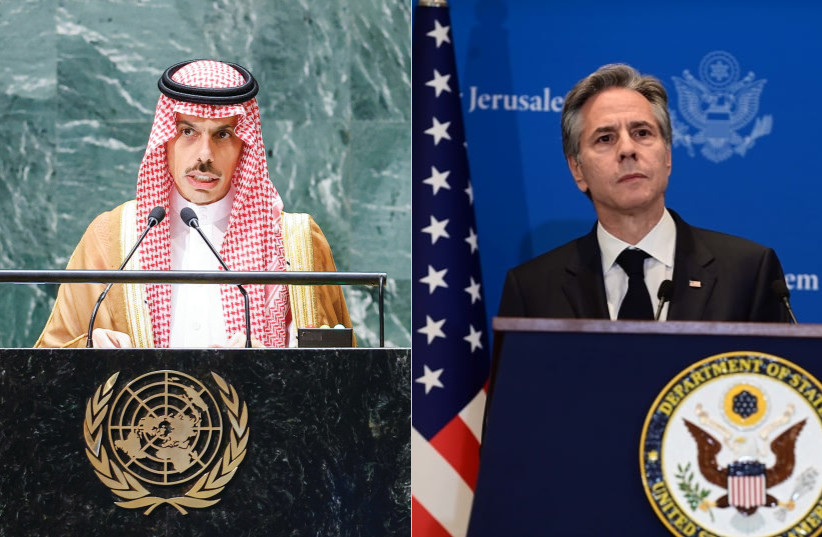
Saudi Arabia put US-backed plans to normalize ties with Israel on ice, sources familiar with Riyadh's thinking told Reuters in Oct, 2023, as the war between Hamas and Israeli forces escalated.
Israel began its military offensive in Gaza after Hamas terrorists killed 1,200 people and took 253 hostages in southern Israel on Oct. 7.
Go to the full article >>Israel-Hamas War: What you need to know
- Hamas launched a massive attack on October 7, with thousands of terrorists infiltrating from the Gaza border and taking some 240 hostages into Gaza
- Over 1,200 Israelis and foreign nationals were murdered, including over 350 in the Re'im music festival and hundreds of Israeli civilians across Gaza border communities
- 136 hostages remain in Gaza, IDF says